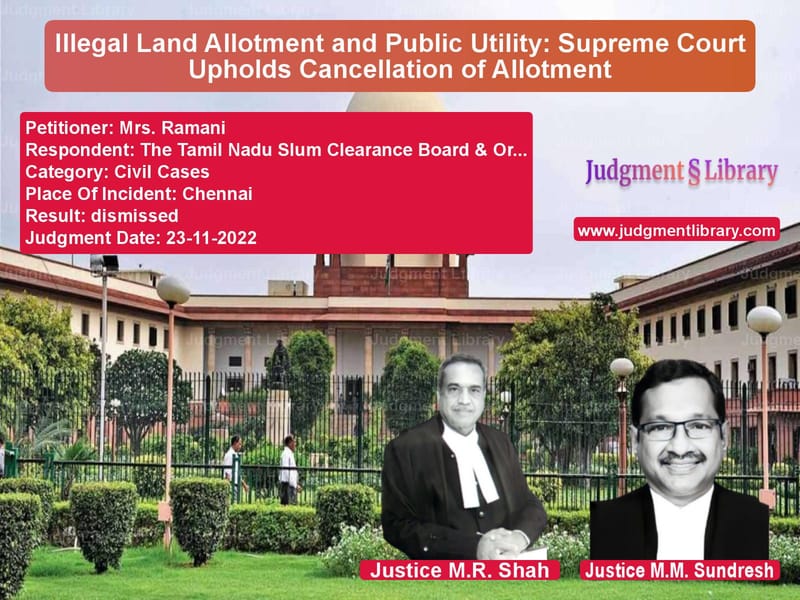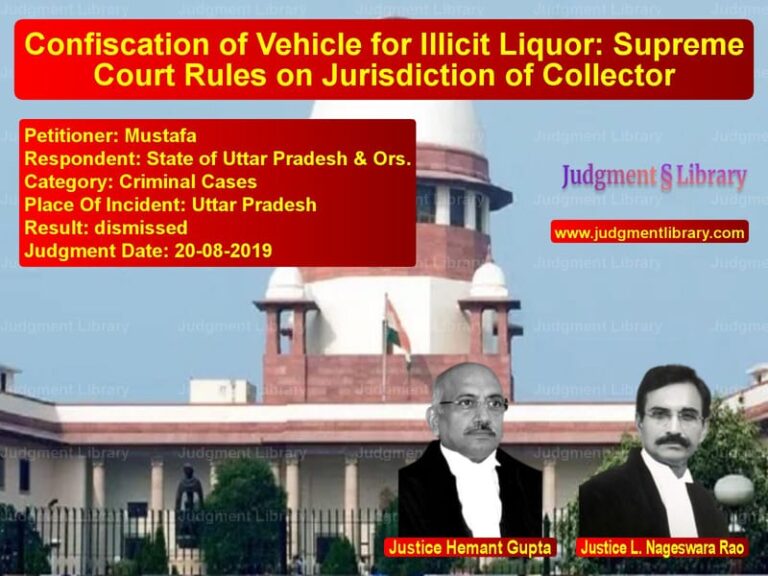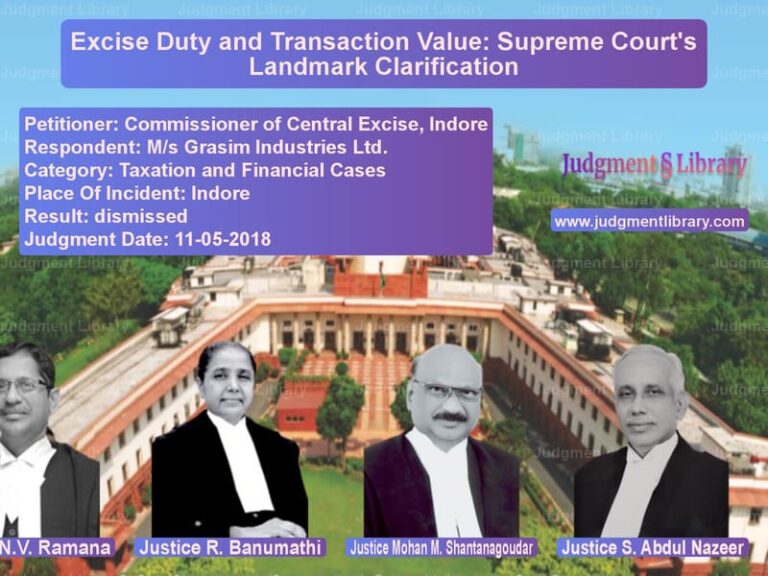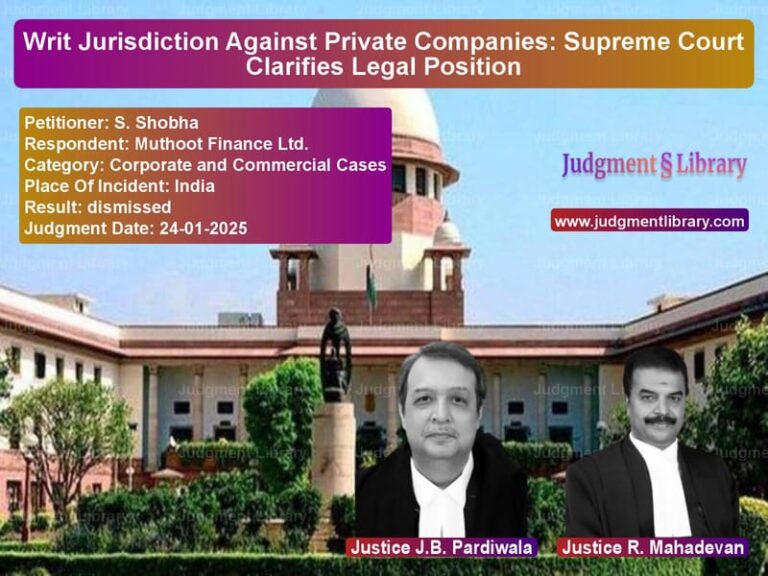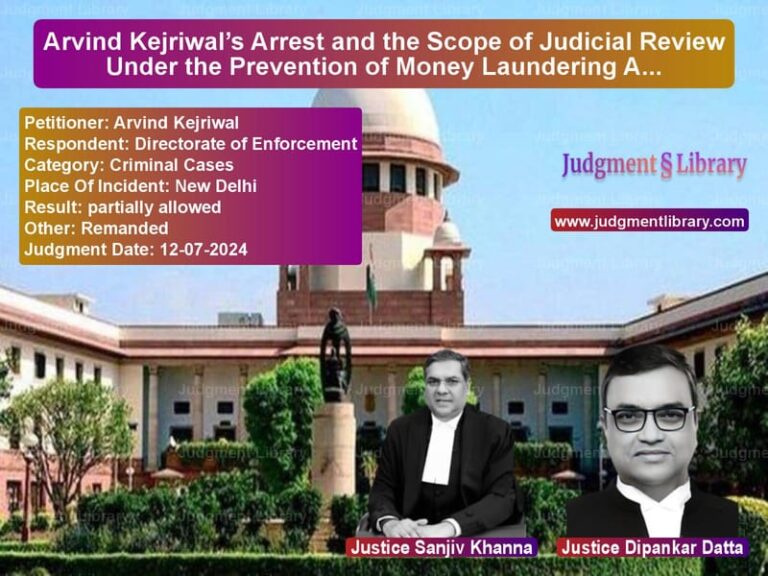Illegal Land Allotment and Public Utility: Supreme Court Upholds Cancellation of Allotment
The case of Mrs. Ramani vs. The Tamil Nadu Slum Clearance Board & Ors. is a significant judgment that addresses the issue of illegal land allotment, public utility, and unauthorized construction. The Supreme Court examined whether an allotment of land, initially designated for public convenience, could be lawfully given to an individual, and if the subsequent cancellation of such allotment was justified.
The case raises critical legal questions about urban planning, public interest, and the authority of state agencies to correct administrative errors. The ruling has long-term implications for land governance and public infrastructure in rapidly urbanizing areas.
Background of the Case
The petitioner, Mrs. Ramani, was allotted a plot in Thirumoolar Colony under the jurisdiction of the Tamil Nadu Slum Clearance Board. The board is responsible for providing housing and infrastructure to economically weaker sections. The petitioner paid all necessary charges and obtained a No Objection Certificate (NOC) for water and drainage connections. However, issues arose when she proceeded with construction on the plot without obtaining the requisite approval from the Chennai Metropolitan Development Authority (CMDA) and the Chennai Municipal Corporation.
The controversy deepened when it was discovered that the plot had been originally earmarked for public convenience, specifically for community toilets and sanitation facilities for the colony’s residents. Following this discovery, the CMDA refused to approve the construction, and the Tamil Nadu Slum Clearance Board issued an order canceling the allotment on 03.06.1996. Despite this, the petitioner continued with the construction, leading to litigation initiated by the affected residents.
Legal Issues Involved
The case presented several key legal issues:
- Was the Tamil Nadu Slum Clearance Board’s cancellation of the allotment legally justified?
- Did the petitioner have a vested right to retain possession of the land?
- Was the petitioner’s construction illegal given her failure to obtain the required approvals?
- Did the residents of the area, represented by the respondents, have legal standing (locus standi) to challenge the allotment?
Arguments by the Petitioner (Mrs. Ramani)
The petitioner advanced the following arguments in her defense:
- She had lawfully obtained the allotment and had made all required payments in compliance with the board’s policies.
- The surrounding area had undergone full development, rendering the land unnecessary for public convenience.
- She had submitted an application for a building plan approval, and any delay in approval was due to administrative inefficiencies rather than her fault.
- The Tamil Nadu Slum Clearance Board had not itself challenged the earlier High Court ruling in her favor, so the respondents had no legal standing to intervene.
- The cancellation of the allotment was arbitrary and violated her property rights.
Arguments by the Respondents (Tamil Nadu Slum Clearance Board & Others)
The respondents, including the Tamil Nadu Slum Clearance Board and affected residents, countered the petitioner’s claims with the following arguments:
- The land had been originally designated for public convenience under the CMDA-approved layout, meaning that it could not be legally allocated to an individual.
- The petitioner’s construction was entirely unauthorized as she did not secure the necessary approvals before proceeding with the building.
- The petitioner demolished existing public toilets without obtaining clearance from the local authorities, depriving local residents of a crucial public amenity.
- The local residents were directly impacted by the loss of public sanitation facilities and, therefore, had standing to challenge the wrongful allotment.
- The allotment to the petitioner was in violation of town planning laws and had to be rectified to restore the designated public purpose of the land.
Supreme Court’s Ruling
The Supreme Court ruled in favor of the respondents and upheld the cancellation of the allotment, dismissing the petitioner’s appeal. The Court stated:
“As the plot was originally reserved for public convenience and was required for public utility, the same could not have been allotted to an individual.”
Furthermore, the Court ruled:
“The petitioner continued with unauthorized construction despite knowing that the allotment had been canceled. No legal rights can be claimed based on illegal actions.”
Legal Precedents Considered
The Supreme Court relied on several precedents in reaching its decision:
- Bangalore Medical Trust vs. B.S. Muddappa & Ors. (1991) 4 SCC 54: The Court emphasized that development schemes are designed to serve the broader public interest and should not be undermined by arbitrary allotments.
- Hyderabad Municipal Corporation vs. P.N. Sharma: The Court reaffirmed that land reserved for public use cannot be privatized or reallocated without substantial justification.
Implications of the Judgment
The Supreme Court’s ruling has broad implications for urban planning and governance:
- Prevention of Unauthorized Land Allotments: Authorities must ensure that land designated for public purposes is not wrongly allocated for private use.
- Strict Compliance with Urban Planning Laws: The judgment underscores the need for strict adherence to CMDA-approved layouts and zoning regulations.
- Protection of Public Interest: Local residents have a right to challenge wrongful allotments that negatively impact public amenities.
- Accountability for Unauthorized Construction: Individuals cannot claim rights over land where construction has been undertaken without due approvals.
Conclusion
The Supreme Court’s judgment in this case reinforces the fundamental principle that public land must serve its designated purpose. By rejecting the petitioner’s claim, the Court has upheld the integrity of urban planning regulations and prevented the unauthorized conversion of public convenience land into private property.
The case sets a precedent for future disputes involving wrongful land allotments and highlights the judiciary’s role in safeguarding public resources against misuse. This ruling ensures that residents have access to necessary public amenities and that urban development follows a structured and lawful approach.
Petitioner Name: Mrs. Ramani.Respondent Name: The Tamil Nadu Slum Clearance Board & Ors..Judgment By: Justice M.R. Shah, Justice M.M. Sundresh.Place Of Incident: Chennai.Judgment Date: 23-11-2022.
Don’t miss out on the full details! Download the complete judgment in PDF format below and gain valuable insights instantly!
Download Judgment: mrs.-ramani-vs-the-tamil-nadu-slum-supreme-court-of-india-judgment-dated-23-11-2022.pdf
Directly Download Judgment: Directly download this Judgment
See all petitions in Property Disputes
See all petitions in Landlord-Tenant Disputes
See all petitions in Specific Performance
See all petitions in Damages and Compensation
See all petitions in Judgment by Mukeshkumar Rasikbhai Shah
See all petitions in Judgment by M.M. Sundresh
See all petitions in dismissed
See all petitions in supreme court of India judgments November 2022
See all petitions in 2022 judgments
See all posts in Civil Cases Category
See all allowed petitions in Civil Cases Category
See all Dismissed petitions in Civil Cases Category
See all partially allowed petitions in Civil Cases Category

